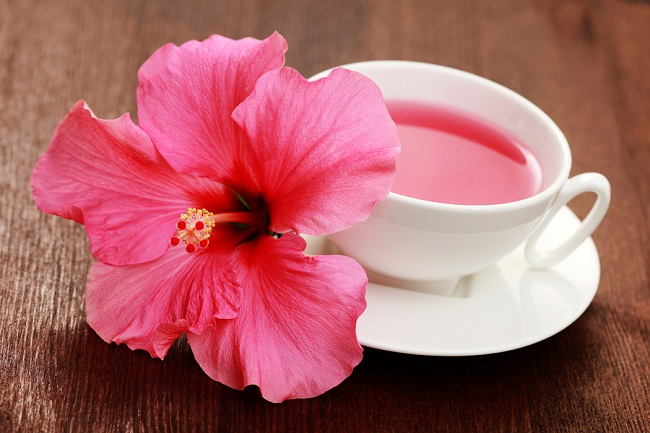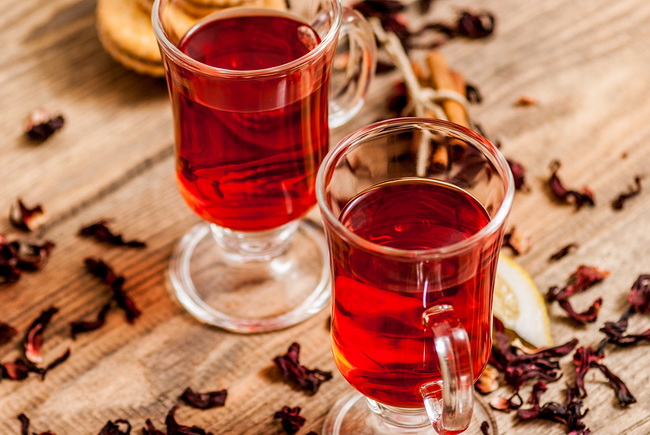- Make It Yourself Lavender Heart-Shaped Bath Bombs!
- 20 Things You Never Knew About “Down There”
- 12 Best Foods For Those Suffering From Arthritis Pain
- 12 Personal Hygiene Mistakes Almost Everyone Makes (Mom Never Told You About #4!)
- 15 Medicinal Plants And Herbs From The Cherokee People
- 12 Mind-Blowing Benefits Of Drinking Coconut Water During Pregnancy
- 12 Outstanding Winter Foods That Won’t Fatten You Up Like A Christmas Turkey
The Health Benefits of Hibiscus Tea

Photo credit: bigstock.com
Oh those beautiful hibiscus trees! They remind people of Hawaii and other tropical places. The flowers have long been appreciated throughout the world for their beautifully light, floral colors and scent. Many cultures have made hibiscus tea a regular part of their diet.
Recently, science has shown that hibiscus tea isn’t just a nicely flavored tea: it also has a couple of health benefits that shouldn’t be missed!
Hibiscus plants, although originally found in Angola, are found all over the world and enjoyed throughout Europe, Asia, the Middle East, North Africa, and India. Although there are some cultures that eat the plant itself, such as in Indian cuisine, most cultures serve it as tea, made from the colored calyces of the flower itself. This can be served hot or cold but it is enjoyed by persons around the world for both its taste and its health.
High Blood Pressure
Hypertension increases the risk of stroke, heart disease, and cardiovascular disease. In our modern world with its high speed, high stress lifestyle, heart disease is the number one killer in America.
Dietary changes can help lower blood pressure, and if you have hypertension adding hibiscus tea to yours might be the answer you have been looking for.
Hibiscus is high in the compounds quercetin and anthocyanin – antioxidants that have a powerful effect on the heart. Quercetin and anthocyanin open the arteries and slow down the release of hormones that tell the arteries to constrict. This is what makes hibiscus tea perfect for those suffering from hypertension. One study showed that subjects who took 250mg of hibiscus extract each day lowered their blood pressure back to what is considered to be normal levels. Another study confirmed the findings, showing that when 65 patients, between the ages of 30 and 70, who had mild to moderate high blood pressure were given hibiscus extract, the group that received the hibiscus showed a significant reduction in their systolic blood pressure when compared to the placebo group. This study was published in the Journal of Nutrition in 2007.
The journal Phytomedicine also published a study involving hibiscus tea that was performed in 2004, where 70 people with hypertension were given either 16 ounces of hibiscus tea before breakfast, or 25mg of captopril (a prescription anti-hypertension medication) twice per day. After 30 days, those who received the tea showed that their diastolic blood pressure had dropped at least 10 points, the same amount as the group who received the prescription captopril.
SEE ALSO: Herbal Remedies for High Blood Pressure
Studies show that drinking just two or three cups of hibiscus flower tea (hibiscus sabdariffa or hibiscus rosa-sinensis) can work as effectively as some prescription hypertension medication, with none of the side effects.
Continue to Page 2

Photo credit: bigstock.com
Anti-Inflammatory
Hibiscus tea is made from the dried calyces of hibiscus flower. Antioxidants are a vital part of our diets, helping to rid the body of free radicals, the destructive molecules that damage our DNA and cause premature aging, wrinkles, and diseases such as diabetes, heart disease, arthritis, and cancer. Calyces are good for our bodies because they contain such high levels of these helpful antioxidants. Antioxidants also help stop chronic inflammation, which are known to cause cancer, IBS, Parkinson’s, Alzheimer’s, infertility, obesity, diabetes, and many other problems. Choosing foods and drinks, such as hibiscus tea, can help stop inflammation before it causes damage to your body. You can actually reverse some of the signs of aging, such as loss of skin elasticity and wrinkles, by adding more antioxidants to your diet. Hibiscus tea is a great way to do exactly that.
If you are pregnant or are trying to become pregnant, or if you are a nursing mother, you should avoid hibiscus tea. There has been some evidence that certain types of hibiscus tea stimulate blood flow in the pelvic area and this can encourage menstruation. If you are taking any prescription medication for hypertension, or any type of medication, speak to your doctor before you discontinue your medication.
































